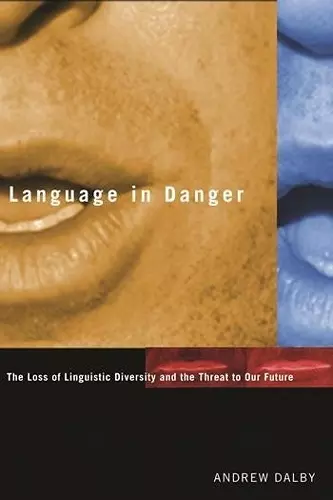Language in Danger
The Loss of Linguistic Diversity and the Threat to Our Future
Format:Hardback
Publisher:Columbia University Press
Published:15th Dec '22
Currently unavailable, and unfortunately no date known when it will be back

Every two weeks the world loses another indigenous language. Evolving over hundreds or even thousands of years, distinct languages are highly complex and extremely adaptable, but they are also more fragile and endangered than we might expect. Of the approximately 5,000 languages spoken around the globe today, Andrew Dalby predicts that half will be lost during this century. How will this linguistic extinction affect our lives? Is there a possibility that humanity will become a monolingual species? Should we care?
Language in Danger is an unsettling historical investigation into the disappearance of languages and the consequences that future generations may face. Whether describing the effects of Latin's displacement of native languages in the aftermath of Rome's imperial expansion or the aggressive extermination of hundreds of indigenous North American languages through a brutal policy of forcing Native Americans to learn English, Dalby reveals that linguistic extinction has traditionally occurred as a result of economic inequality, political oppression, and even genocide. Bringing this historical perspective to bear on the uncertain fate of hundreds of pocket cultures-cultures whose languages are endangered by less obvious threats, such as multinational economic forces, immigration, nationalism, and global telecommunications—Language in Danger speaks out against the progressive silencing of our world's irreplaceable voices.
More than an uncompromising account of the decline of linguistic diversity, Language in Danger explains why humanity must protect its many unique voices. Since all languages represent different ways of perceiving, mapping, and classifying the world, they act as repositories for cultural traditions and localized knowledge. The growing trend toward linguistic standardization—for example, politically designated national languages—threatens the existence of more marginalized cultures and ethnic customs, leaving only a few dominant tongues. The resulting languages become less flexible, nuanced, and inventive as they grow increasingly homogenized. Dalby argues that humanity needs linguistic variety not only to communicate, but to sustain and enhance our understanding of the world. People do not simply invent words out of thin air: our creativity and intelligence are, to a significant degree, dependent on other languages and alternate ways of interpreting the world. When languages intermix, they borrow and feed off each other, and this convergence catalyzes the human imagination, making us more intelligent and adaptable beings.
Provides an engrossing account of both how languages evolve and interact with one another, and of how much is lost when the last speaker of [a language] dies. -- Michael Dirda * Washington Post *
Warning of the loss of linguistic diversity as speakers are assimilated to global languages, Dalby argues that language loss entails an irreplaceable loss of local cultural knowledge... [T]his is a successful presentation of a key argument for preserving linguistic diversity. * Choice *
Passionate and lucid... the whole book works up to a magnificent final chapter... ardent, dignified, and convincing. * The Spectator *
A wide-ranging and lucid study of how languages die. * Sunday Telegraph *
This argument about why we should care about the present-day loss of languages is convincing. * Publishers Weekly *
Andrew Dalby (2003), as author of Language in Danger provides an interesting account of how languages evolve and interact with one another... The aim to promote awareness for cultural linguistic diversity, regardless of globalisation, can be heard loud and clear. -- Nicholas Alexis Zoffel * Language and Intercultural Communication *
ISBN: 9780231129008
Dimensions: unknown
Weight: unknown
352 pages